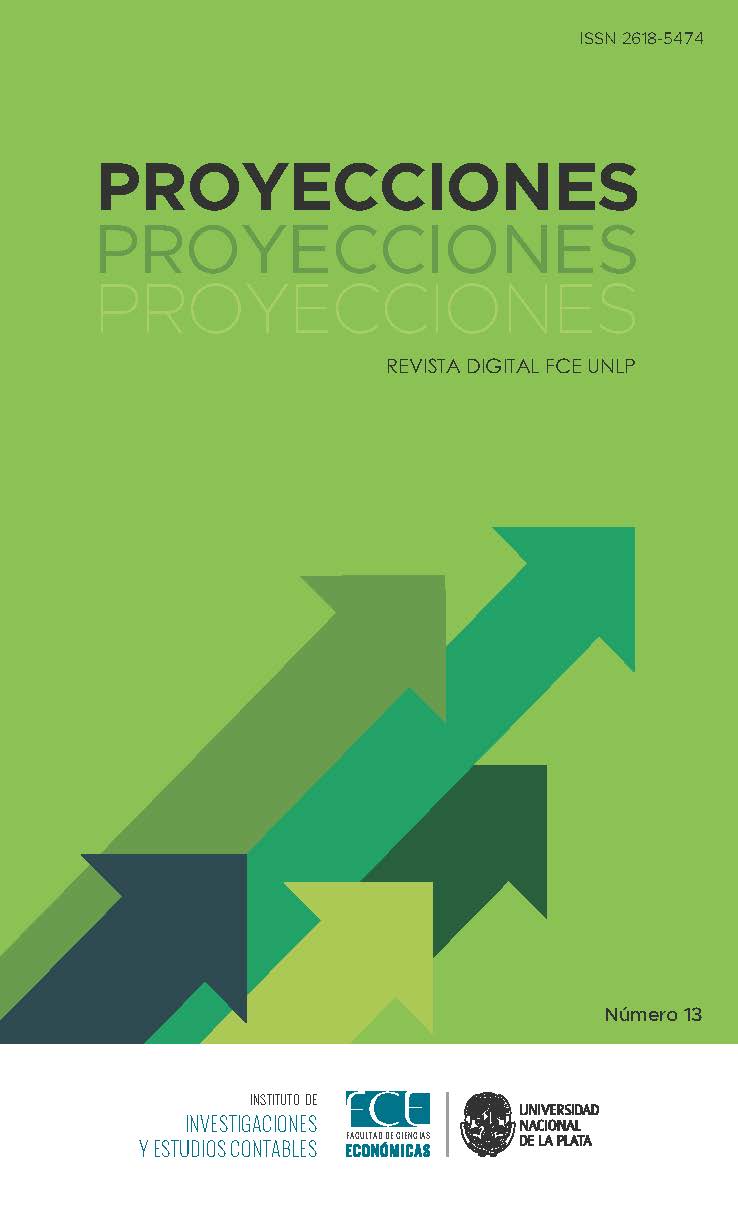Components to analyze enviromental accounting results
DOI:
https://doi.org/10.24215/26185474e006Keywords:
Comparative analysis, Sustainability reports, Uruguay public enterprises, VisibilityAbstract
The tenacious threat to health, quality of life and desire because the environment is protected in the long term, makes collective social action constant, which requires governments to act quickly against scourges. Productive, industrial and commercial sectors, multidisciplinary teams between scientists and technicians work based on a progressive awareness to combine ecology, biology, economics, accounting, sociology, architecture, law and many other disciplines and thus get involved in the protection and stability of the planet's environment.
It is a urgent desire in which we all require responses to so many environmental requirements, to reduce the friction and tension generated by the concern, so, especially auditors, accountants and, social, financial and environmental information reviewers, use any methodological means to capture, evaluate and interpret and then professionally disseminate the appropriate environmental socio-economic information.
Based on the exposed, in this paper three components are studied to analyze the results of an Environmental Accounting: The REA Financial Information System (Resources, Events and Agents) because it handles the accounting data in a binding manner, by events; the GRI Guidelines implemented by the Global Reporting Initiative and the International Financial Reporting Standards IFRS. It is a study to follow to shape a methodology, so that, immediately, based on the findings, the policies and strategies are defined so that the organizations reorient and / or define their environmental issues and the interested parties make the pertinent decisions to better convenience.
A methodology for research and reporting is developed when studying the environmental component of any entity, a methodological development is carried out, conclusions and proposals are provided. It is concluded that although the information studied comes from the REA Financial Information System, studying the GRI Guidelines of the Global Reporting Initiative helps the professional, the researcher, auditor, environmental reviewer to acquire and complement their knowledge together with the third component of this work as are the International Financial Reporting Standards whose Conceptual Framework clears the viability for environmental matters.
Downloads
Metrics
References
Actividades de Construcción y Servicios (ACS). (2017). Informe Económico -Financiero 2017. Obtenida el 01 de septiembre de 2019 de
Asociación Española de Contabilidad y Administración Empresa. (AECA). (2008) Actualidad Contable: Recopilación de casos prácticos NIIF. Asociación Española de Contabilidad y Administración Empresa. Deloitte Financial Callenge. Obtenida el 10 de septiembre de 2019 de
https://www.academia.edu/33949218/Casos_practicos_newsletter
Chacón, Y. (2009). Los Costos medioambientales en la gestión de las organizaciones. Revista OIDLES 3, (6) 1-26. Obtenida el 11 de septiembre de 2019 de
http://www.eumed.net/rev/oidles/06/ycp.htm
Conferencia de Expertos sobre Normas Internacionales de Contabilidad y presentación de informes (ISAR). (2016). NICNIIF es un sitio propiedad de la Organización Interamericana de Ciencias Económicas OICE. Obtenida el 09 de septiembre de 2019 de
Freedman, M. y Jagg, B. (2006). Editorial, Freedman, M. y Jaggi, B.(Ed.) Contabilidad Ambiental. Avances en Contabilidad y Gestión Ambiental, Vol. 3, Emerald Group Publishing Limited, Bingley, xii-xv. Obtenida el 09 de septiembre de 2019 de
https://doi.org/10.1016/S1479-3598(06)03010-X
Garrido, S. (2011). La Contabilidad Ambiental en las NIIF. Información Financiera, Gerencia y Control, publicación semestral (2), 21-47.
Garrido, S. (2019). Contabilidad Ambiental (Mis notas referenciales para su estudio e implementación). Obtenida el 12 de septiembre de 2019 de
https://www.autoreseditores.com/libro/14525/somer-garrido-diaz/contabilidad-ambiental.html
Garrido Díaz, S. (2019). Estados Financieros que reflejan la incidencia ambiental. Obtenida el 12 de septiembre de 2019 de
Global Reporting Initiative (GRI) standards download center. (2016). La GRI publica las normas sobre informes de sostenibilidad. NICNIIF es un sitio propiedad de la Organización Interamericana de Ciencias Económicas OICE. Obtenida el 31 de agosto de 2019 de
Global Reporting Inititative (GRI). (2018). GRI 403: Salud y Seguridad en el Trabajo. Obtenida el 30 de Agosto de 2019 de
International Accounting Standards Board IASB. (2004). Derechos por la Participación en Fondos para el Desmantelamiento, la Restauración y la Rehabilitación Medioambiental. Comité de Interpretaciones de las Normas Internacionales de Información Financiera (CINIIF) Nº 5
International Accounting Standards Board IASB. (2006). Norma Internacional de Contabilidad Nº 16 Propiedades, Planta y Equipos. Obtenida de 12 de septiembre de 2019 de
http://www.leyes.com.py/documentaciones/infor_interes/contabilidad/NIC/nic/NIC16.pdf
International Accounting Standards Board IASB. (2006). Norma Internacional de Contabilidad Nº 37 Provisiones, Activos y Pasivos Contingentes. Obtenida de 12 de septiembre de 2019 de
http://www.leyes.com.py/documentaciones/infor_interes/contabilidad/NIC/nic/NIC37.pdf
International Accounting Standards Board IASB. (2006). Norma Internacional de Contabilidad Nº 41 Agricultura. Obtenida de 12 de septiembre de 2019 de
http://www.leyes.com.py/documentaciones/infor_interes/contabilidad/NIC/nic/NIC41.pdf
International Accounting Standards Board IASB. (2006). Norma Internacional de Contabilidad Nº 2 Existencias. Obtenida de 12 de septiembre de 2019 de
http://www.leyes.com.py/documentaciones/infor_interes/contabilidad/NIC/nic/NIC2.pdf
Negash, M. (2009). Los IFRS y la contabilidad ambiental. Obtenida el 11 de septiembre de 2019 de
https://www.nicniif.org/files/otros/Los-Ifrs-y-La-ad-Ambiental.pdf
Mc Carthy, W. (1980). The REA Accounting Model: A Generalized Framework for Accounting Systems Shared Data Environment. Obtenida el 06 de septiembre de 2019 de
Muñoz, D. (2018). Contabilidad ambiental Empresarial, Análisis de Reporte de Sostenibilidad y Gestión Empresa Colombina. Obtenida el 11 de septiembre de 2019 de https://repository.unimilitar.edu.co/bitstream/handle/10654/20550/Mu%C3%B1ozGomezDoralba2018.pdf?sequence=1&isAllowed=y
Quinche, F. (2008). Uma evaluación crítica de la contabilidade ambiental. Revista Facultad Ciencias Económicas, XVI, 197-216.
Rincón Angel, A. (2017). Sistema contable de los Activos Biológicos y aplicación NIC 41.Obtenida el 11 de septiembre de 2019 de
https://repository.unimilitar.edu.co/bitstream/handle/10654/16572/rinc?sequence=1
Stichting Global Reporting Initiative, Global Sustainability Standards Board (GSSB), Global Reporting Initiative (GRI). (2016). Conjunto Consolidado de Estándares GRI para la Elaboración de Informes de Sostenibilidad 2016. Obtenida el 7 de febrero de 2019 de
Downloads
Additional Files
Published
How to Cite
Issue
Section
License
El material publicado en la revista se distribuye bajo una licencia de Creative Commons de Atribución-NoComercial-SinDerivadas 4.0 Internacional (CC BY-NC-ND 4.0). Esta licencia obliga a otros a dar crédito de manera adecuada, brindar un enlace a la licencia, e indicar si se han realizado cambios; no permite hacer uso comercial de la obra; y si se remezclara, transformara o creara otro material a partir de la obra, no podrá ser distribuida esa modificación.




























